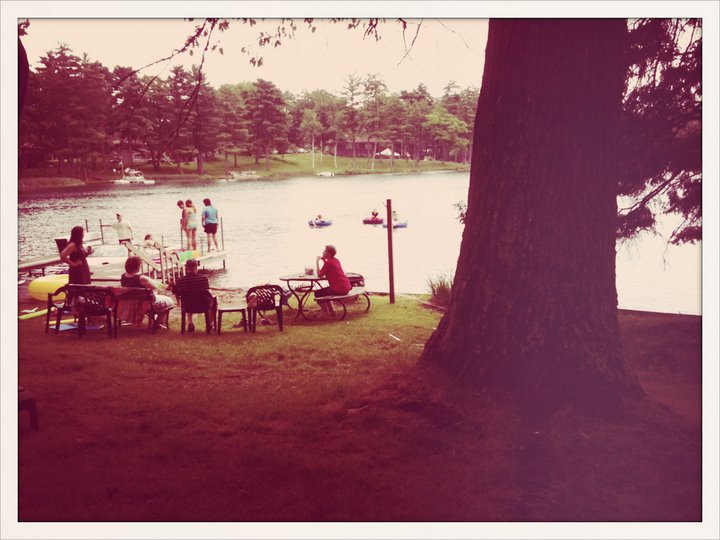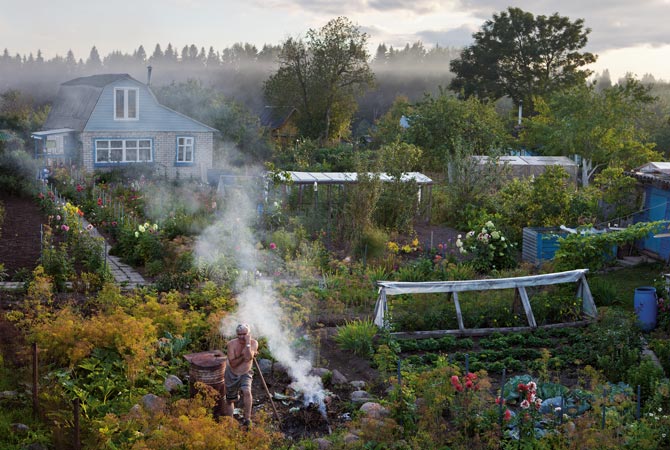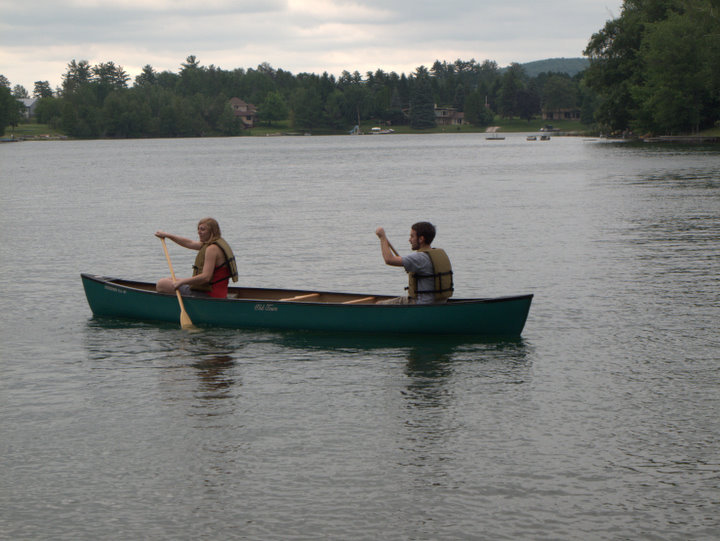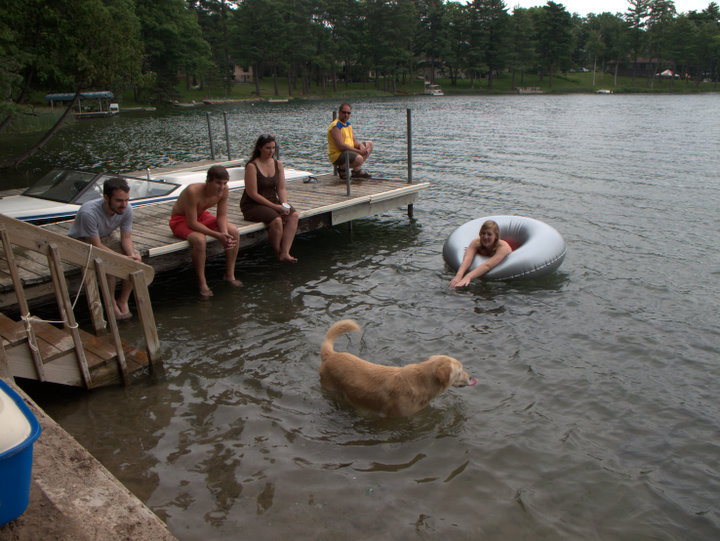The Summer Cottage

"Decor tends to out-of-date calendars, mismatched crockery, paintings of bears in the forest, and lace curtains hanging in doorways to defend against mosquitoes."
I read this description several times, in a perfectly-timed National Geographic article about the Russian dacha, which is a fully Russian cultural element, and is basically the little plot of land where a family escapes the drudgery of their urban dwelling during the brief Russian summer. It is a place where gardens are kept, which the article points out was crucial during the days of food shortages, when people relied on these part-time homesteads as sources for food.
The dacha has a fascinating history, within Russian culture, as the land that was parceled out to courtiers during the reign of Peter the Great, as the gifts presented to political and cultural elites during Stalin's rule as one mechanism tool to assist in "keeping writers under control" by keeping an eye on them in one particular neighborhood of dachas outside a city. In the modern age, the McMansion versions owned by nouveau riche Russians, called kottedzhy (cottages), are their own cultural entity, with different meaning and use entirely. And the article points to the changing larger meaning and use of these tiny summer homes, as places of refuge from stark, urban apartment buildings and the bustle of weekday life and work, rather than as pieces essential to survival, and certainly lacking finer amenities like indoor plumbing and electricity. Some full-time dacha dwellers resent the fancier interpretations of their neighbors who come in from the city.

I can see the resentment that might lie underneath these tiny cottages and their crop-growing plots of land, and the voices from these dachas make for perfect summer reading. Because, all cultural arguments aside, it made me fully nostalgic and absolutely homesick for the dacha of my own family and childhood.
"Everyone in Russia has a dacha story. It may be a trace of childhood memory like playing ball late into evening by grace of a sun that won't set, gathering pine-cones to perfume the samovar fire, or swimming in an icy pond rimmed by green spires of spruce," the article waxes.
My aunt and uncle have owned their tiny cottage on Moon Lake in Iron Mountain, Michigan at least as long as my lifetime. It is our automatic location for family picnics and events during the few months of summer weather they get in the Upper Peninsula of the state. A short season means that crescent-shaped Moon Lake, like those Russian bodies of water, never really gets "warm," but it is the most refreshing kind of clean, clear, deep-water northern lake, and I adore it. Various boats haven pulled me and cousins and the occasional friend behind behind it, in inter-tubes, our bodies bouncing and our hands gripped for dear life on the handles, until we give in and disappear behind the wake of our vessels. We played 'King of the Raft" on the old wooden raft my uncle constructed and anchored just offshore, sometimes with so many of us on it that it disappeared below the surface of the water, leaving us standing on the glittering blue-black top of the lake.
 All the odds and ends of our lake days are stored inside the tiny cottage on the property, which for as long as I've known it has not had any room devoted to actual habitation. There is one bedroom, and it is filled to the ceiling with wetsuits, inter-tubes, water skiis, beach towels, extra clothing, blankets, and floating devices. Each room is filled with the kind of old furniture that has retired from full-time use in primary dwellings, and now resides in the cottage, so each is a relic of the eras past. The whole place feels like the 1970s, underlined by the dark orange shag carpet with decades of dirt, grass, and beachy foot debris sunken in--but somehow it is still soft and comforting after the chilly outside air and water. Their are several 100-piece puzzles in tiny square boxes, the same ones have been there my entire life, and I always choose the one that is a big bowl of strawberries. This is the only one I even remember, and I loved to sit inside and let my swimsuit dry while I worked on that puzzle.
All the odds and ends of our lake days are stored inside the tiny cottage on the property, which for as long as I've known it has not had any room devoted to actual habitation. There is one bedroom, and it is filled to the ceiling with wetsuits, inter-tubes, water skiis, beach towels, extra clothing, blankets, and floating devices. Each room is filled with the kind of old furniture that has retired from full-time use in primary dwellings, and now resides in the cottage, so each is a relic of the eras past. The whole place feels like the 1970s, underlined by the dark orange shag carpet with decades of dirt, grass, and beachy foot debris sunken in--but somehow it is still soft and comforting after the chilly outside air and water. Their are several 100-piece puzzles in tiny square boxes, the same ones have been there my entire life, and I always choose the one that is a big bowl of strawberries. This is the only one I even remember, and I loved to sit inside and let my swimsuit dry while I worked on that puzzle.
The best thing about these nostalgic bits of their cottage is that my aunt has changednothingsince. That carpet, the strawberry puzzle, the room full of lake supplies, the kitchen and dining room areas strewn with clutter, sale items, assorted kitchenware, piles of cases of pop (not soda, this is the U.P.), the old blow-up doll we used to dress in real clothes, even the apple cinnamon air freshener for the singular little bathroom: the same.
 This is the place I envisioned in my mind as I read about the Russian dacha; it is the place of a thousand summer memories, of enjoying the short months of warm sunshine, a break from the winter cold. As I got older, obviously, I moved to Georgia, with its own excess of heat. But I remember one summer, when we were back visiting for a few weeks, one aunt remarked that my skin had grown considerably darker there than it was when I had arrived. The Michigan sun was just the right strength, where you can survive outside all day, laying along the dock on your old, faded towel, sitting in the swing beneath the pine trees. This time of year in Georgia, all I really want to do is sit inside, in the air conditioning. Pools are okay, as a source of cooling off, but I never was much of an ocean, saltwater girl. Give me those glorious Michigan lakes any day. And a scoop of Blue Moon ice cream, which only those from the Midwest/Wisconsin/Michigan zone will ever have tried (unless you know someone from the area, who has let you in on the secret).
This is the place I envisioned in my mind as I read about the Russian dacha; it is the place of a thousand summer memories, of enjoying the short months of warm sunshine, a break from the winter cold. As I got older, obviously, I moved to Georgia, with its own excess of heat. But I remember one summer, when we were back visiting for a few weeks, one aunt remarked that my skin had grown considerably darker there than it was when I had arrived. The Michigan sun was just the right strength, where you can survive outside all day, laying along the dock on your old, faded towel, sitting in the swing beneath the pine trees. This time of year in Georgia, all I really want to do is sit inside, in the air conditioning. Pools are okay, as a source of cooling off, but I never was much of an ocean, saltwater girl. Give me those glorious Michigan lakes any day. And a scoop of Blue Moon ice cream, which only those from the Midwest/Wisconsin/Michigan zone will ever have tried (unless you know someone from the area, who has let you in on the secret).
I haven't lived in Michigan since 1998, but every year around this time, I long for the lake, a day or two or three at that cottage, k-bars and sub sandwiches and pop at the picnic table and a visit to that strawberry puzzle. To me, a little cottage on a tiny lake in Upper Michigan is the most ideal summer hideaway I can imagine. I only hope I will continue to have access to a place like that, and the means to get there every now and then. There are plenty of jet-setting locales and beautiful, cultural, otherworldly places I also want to visit, too. But there is something engrained in my being that will always hold clear, Michigan lakes and tiny, cozy cottages as special. It's a lot like the daughter who arrived at her father's dacha in the article:
"She travels everywhere," Boris says. "Egypt, Italy, Turkey." This time, Vladislava, who works in advertising in St. Petersburg, had gone to comfortable, orderly Switzerland. But Vladislava had had her fill of Swiss perfection. Now she longed for the familiar warmth of cobbled-together, unruly Nertsy [the dacha community where her father lives]. She sat on the deck of the family dacha and gazed at the calm, green oval of Lake Nertsy. Sunbathers stretched out on half-sunken docks splintered by winter ice. Water lilies floated like tiny yellow coronets. "Lake Geneva," she said airily. "It's just a pond."
This is the perfect sentiment to describe the feeling of comfort in a place like this; it goes beyond aesthetic or appearance--in fact, it is a place often filled with kitsch. But it is also a place of memory, of freedom, and of little carefree moments, added up over time.
